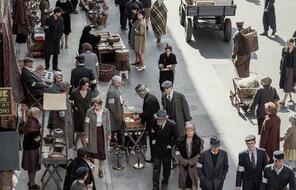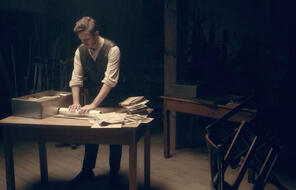Difficult Choices in Poland
At a Glance
Language
English — USSubject
- History
- The Holocaust
Throughout Europe, in occupied countries and in those that collaborated with Nazi Germany, people witnessed the persecution and murder of Jews. Some people spoke out or attempted to help Jews. Others helped the Nazi regime carry out its murderous activities. Between these two extremes were a range of responses. Some people did nothing in response to what they saw because they feared punishment for interfering or were preoccupied with their own wartime difficulties. Doing nothing could also indicate tacit approval of the persecution and killing of certain groups. Some people used the opportunities opened up by the war for revenge or personal gain. For instance, some people stole from the homes of victims, and many informed on their neighbors or colleagues for actions forbidden by the Germans, such as hiding Jews. The stories of Karolcia Sapetowa and Zygmunt Klukowski reveal some of the difficult choices people were forced to make in these circumstances.
Karolcia Sapetowa lived in a small village near the Polish city of Wadowice. Before the German occupation, she worked as a maid for a Jewish family, and once the Germans arrived she sheltered two of the family’s children in her house. The rest of the family was confined in a ghetto and then deported to a concentration camp. Sapetowa’s neighbors grew fearful of the Jewish children’s presence in their neighborhood. It was very risky to protect Jews in Poland because the punishment could be death for the family or even the entire town. After the war, Sapetowa recalled:
At the beginning the children would go out of the house, but when relationships got more tense, I had to hide them inside. But even this did not help. Local people knew that I was hiding Jewish children, and threats and difficulties began from all directions—that the children should be handed over to the gestapo, that the whole village might be burned in reprisals, or murdered, etc. The village head was on my side, and this often gave me peace of mind. People who were more aggressive and insistent I appeased with an occasional gift, or paid them off.
But this did not last long. SS men were always looking around, and again protests started until a certain day they told me that we had to remove the children from this world, and they put together a plan to take the children to the barn and there, when they fell asleep, to chop their heads off with an ax.
I was walking around like mad. My elderly father completely stiffened. What to do? What am I to do? The poor miserable children knew about everything, and before going to sleep, they begged us: “Karolciu [sic], don’t kill us yet today. Not yet today.” I felt that I was getting numb, and I decided that I would not give up the children at any price.
I got a brilliant idea. I put the children on a cart, and I told everybody that I was taking them out to drown them. I rode around the entire village, and everybody saw me and they believed, and when the night came I returned with the children . . . 1
Zygmunt Klukowski was a doctor in the Polish city of Szczebrzeszyn. He was a member of the Polish underground resistance and was hostile to the German occupiers. But when the Germans began to massacre Jews in his city on May 8, 1942, he had to choose whether or not to help the victims. He wrote about these events, and the dilemma he faced, in his diary:
May 8 [1942] Today we survived a terrible day. . . . The Jews are terrified. Women are crying and tearing their clothes. Men went with shovels to dig graves in the cemetery, and the dead were transported there by horse-drawn wagon. Dr. Bolotny, the only Jewish physician in town, came to me begging for help. He could not do the work alone with so many wounded, some critically. I am saddened that I had to refuse to give any help at all. I did this only because of strict orders by the Germans. This was against my own feeling and against a physician’s duties. With my eyes I can still see the wagons filled with the dead, one Jewish woman walking along with her dead child in her arms, and many wounded lying on the sidewalks across from my hospital, where I was forbidden to give them any help.
May 9 [1942] I learned that yesterday’s search of my hospital was because of a denunciation. A man named Wojtowicz told the Germans that I hid several Jews in the hospital. He even gave names. The way some Poles behave is completely out of line. During the massacre some even laughed. Some went sneaking into Jewish houses from the back, searching for what could be stolen. 2
Connection Questions
- How does this reading reveal the different ways that Poles responded to the persecution of Jews under German rule?
- What dilemmas did Karolcia Sapetowa and Zygmunt Klukowski face? What forces shaped their responses to those dilemmas?
- What role did fear play in the actions of the Poles described in this reading? What effect can fear have on a person’s universe of obligation?
How to Cite This Reading
Facing History & Ourselves, "Difficult Choices in Poland," last updated August 2, 2016.








